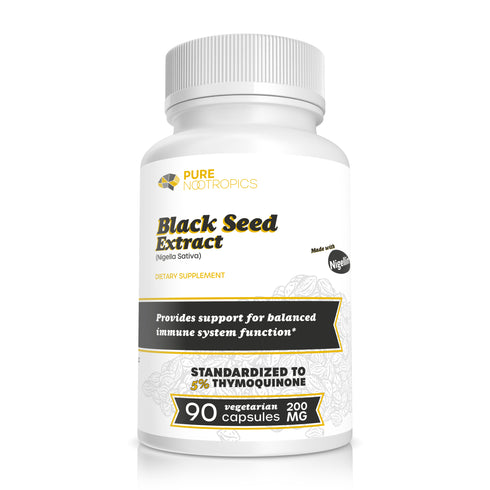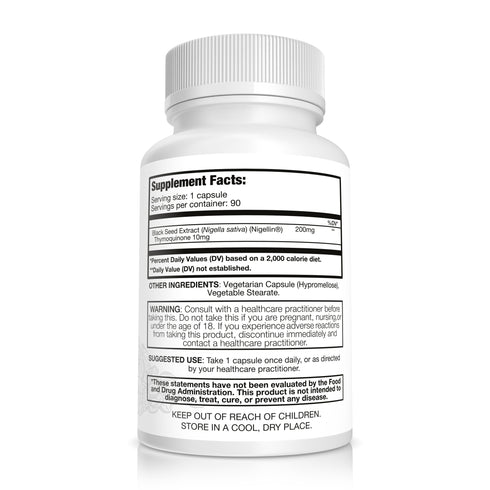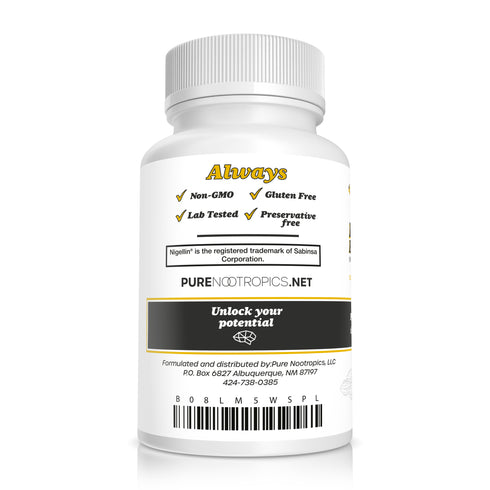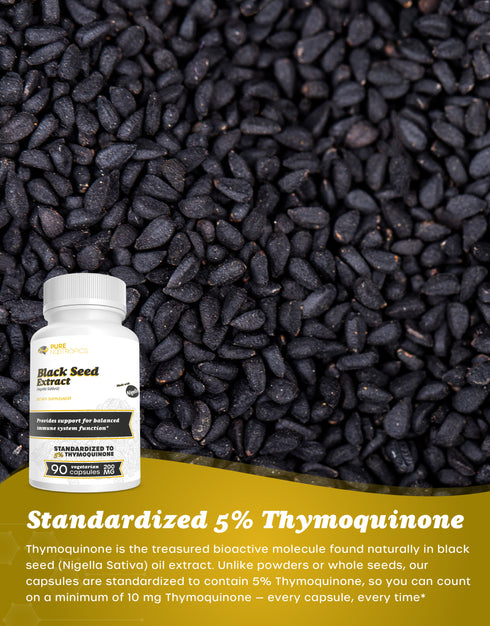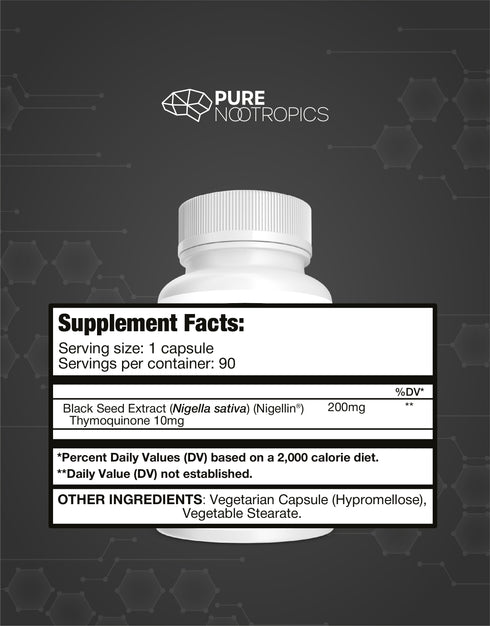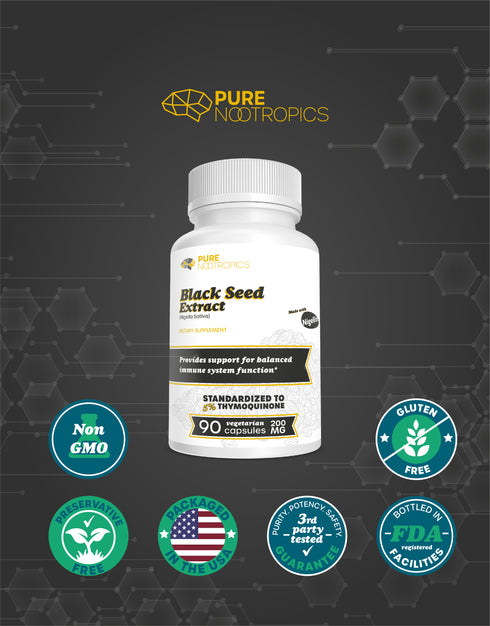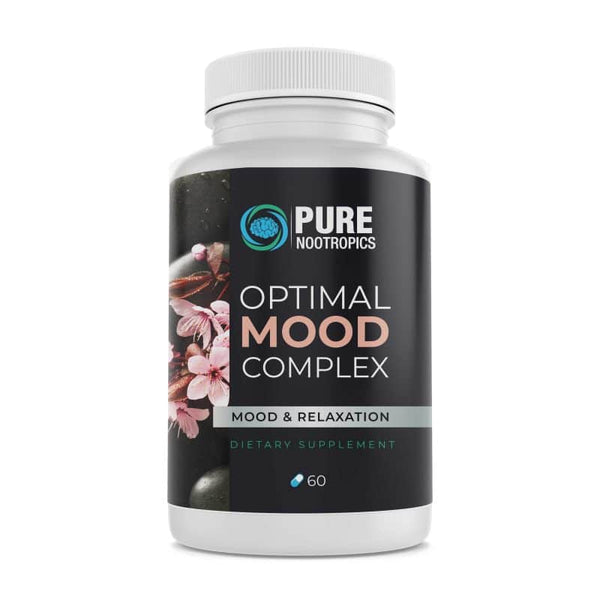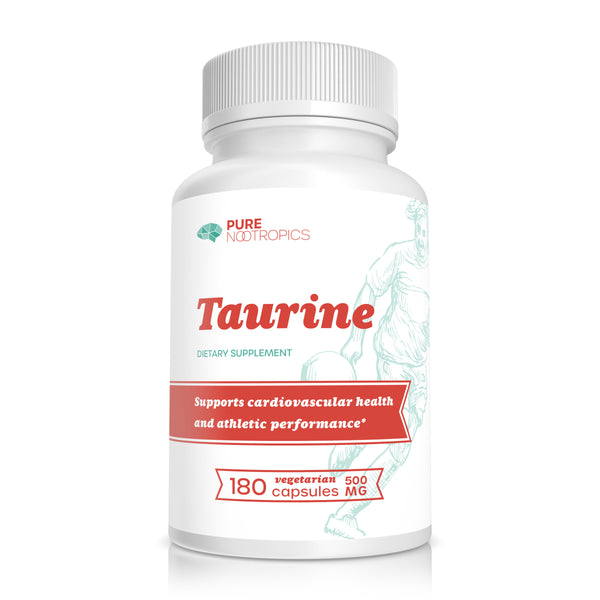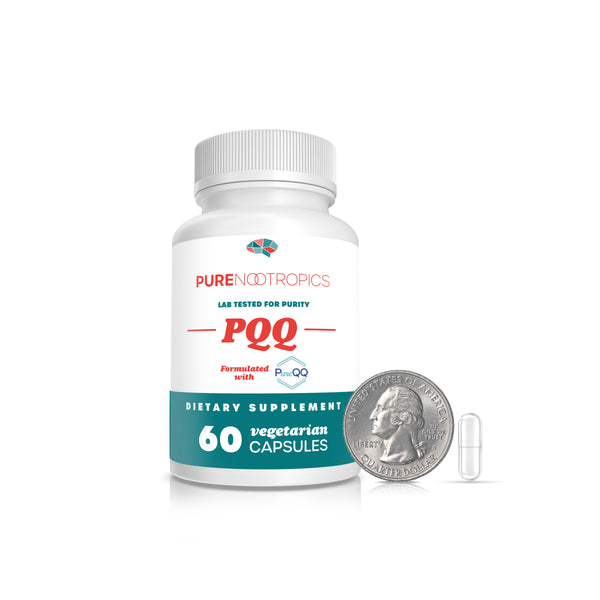Nigellin® Onyx Black Seed Oil Extract is an herbal supplement standardized to 5% of the treasured bioactive thymoquinone molecule. Expertly created with the best and most eco-friendly extraction process using no chemical solvents, our black seed oil extract contains the highest amount of thymoquinone over the leading competitors’ extracts. (ref)(ref)*
Nigellin® Black Seed Oil Extract Benefits
- Supports balanced immune system function (ref)*
- Supports cardiovascular health and healthy blood pressure (ref)*
- Supports liver health (ref)*
Nigellin® Black Seed Oil Extract Description
Nigella sativa (also known as Black Caraway Seed, Black Seed Oil, and Kalonji) is a prized flowering plant which produces black seeds containing a powerful bioactive molecule called thymoquinone (1).
The Nigella sativa plant is part of the Ranunculaceae family which is native to southwest Asia and has been grown and cultivated in North Africa and Europe for over 2000 years (2)(4).
Its seeds contain a variety of constituents and fatty acids, but its’ thymoquinone has been isolated as its primary bioactive ingredient. The black seeds of the N. sativa plant have been used as a pungent spice and condiment, and the oil pressed from the seeds has been used as a folkloric remedy or as cosmetic oil for the skin and hair (2)(1).
It is known by many names depending on its cultural location; for instance, it is known as black cumin in English-speaking countries even though black cumin comes from another plant (B. bulbocastanum) (3).
Thymoquinone is found in the essential oil portion of the N. sativa seed. The remainder of the seeds are proteins, saponins, and alkaloids (2).
Since the thymoquinone concentration is the most important bioactive constituent, it is the ingredient to which N. sativa seed extracts are standardized. The two most common extraction methods are to cold press the oil or to use a chemical solvent like hexane or methanol. A third option for extraction has been proven to provide the highest amount of thymoquinone and antioxidants and is the preferred industry method for extraction of the active properties of the seed. This method is called supercritical fluid extraction; and because it uses liquid carbon dioxide to extract the phenolic compounds from the crushed seeds, it provides a higher yield of active ingredients and is the most environmentally friendly choice (6).
Pure Nootropics chooses to use this superior form of black seed oil extract which has been expertly formulated by the Sabinsa company in their trademarked product Nigellin® (7).
Nigellin® Black Seed Oil Extract Dosage
Pure Nootropics’ Nigellin® Onyx Black Seed Oil Extract Capsules provide 200 mg of N. sativa extract standardized to 5% thymoquinone (a minimum of 10 mg of thymoquinone) per capsule. Suggested use for adults is 1 capsule by mouth once daily, or as directed by your healthcare practitioner.
Nigellin® Side Effect
Nigella sativa may interact with medications that use the substrates CYP2D6 and CYP3A4. Please consult your healthcare practitioner before supplementation if you are taking medications (8).
† For further information, please see references tab above.
The references below are not meant to imply that any of our products treat, cure, or diagnose any disease or human condition. References to clinical studies and pre-clinical studies may use varying dosages and may not represent the dosages or subsequent results of products we sell; however, the references provided are pertinent to the subject supplement itself. References provided are intended for research and informational purposes only and do not represent the entire body of knowledge available on the subject(s) referenced; nor do they represent all possible outcomes associated with the subject(s) referenced including, but not limited to, adverse effects, precautions, or chemical interactions within the human body. The Content provided on this website is not intended to be a replacement for professional medical advice, treatment or diagnosis. Never ignore the advice of a medical professional or delay in attaining professional advice because of information or impressions you gather on this website. Choosing to rely on any information provided by the Content of this website is solely at your own risk. We encourage our audience to do their own research beyond the resources we have provided so your decision is as educated as possible.
Mohammed, Nameer Khairullah et al. “The Effects of Different Extraction Methods on Antioxidant Properties, Chemical Composition, and Thermal Behavior of Black Seed (Nigella sativa L.) Oil.” Evidence-based complementary and alternative medicine : eCAM vol. 2016 (2016): 6273817. doi:10.1155/2016/6273817
“Nigellin.” doi:https://www.sabinsa.com/nigellin.
Supports balanced immune system function*
Gholamnezhad, Zahra et al. “Clinical and experimental effects of Nigella sativa and its constituents on respiratory and allergic disorders.” Avicenna journal of phytomedicine vol. 9,3 (2019): 195-212.
Supports cardiovascular health and healthy blood pressure*
Fallah Huseini H, Amini M, Mohtashami R, et al. Blood pressure lowering effect of Nigella sativa L. seed oil in healthy volunteers: a randomized, double-blind, placebo-controlled clinical trial. Phytother Res. 2013;27(12):1849-1853. doi:10.1002/ptr.4944
Supports liver health*
Mollazadeh, Hamid, and Hossein Hosseinzadeh. “The protective effect of Nigella sativa against liver injury: a review.” Iranian journal of basic medical sciences vol. 17,12 (2014): 958-66.
1. Eid, Ahmad M et al. “A Review on the Cosmeceutical and External Applications of Nigella sativa.” Journal of tropical medicine vol. 2017 (2017): 7092514. doi:10.1155/2017/7092514
2. Khader, Mohannad, and Peter M Eckl. “Thymoquinone: an emerging natural…with a wide range of medical applications.” Iranian journal of basic medical sciences vol. 17,12 (2014): 950-7.
3. Forouzanfar, Fatemeh et al. “Black cumin (Nigella sativa) and its constituent (thymoquinone): a review on antimicrobial effects.” Iranian journal of basic medical sciences vol. 17,12 (2014): 929-38.
4. Tavakkoli, Alireza et al. “Review on Clinical Trials of Black Seed (Nigella sativa ) and Its Active Constituent, Thymoquinone.” Journal of pharmacopuncture vol. 20,3 (2017): 179-193. doi:10.3831/KPI.2017.20.021
5. Staniek, Katrin, and Lars Gille. “Is thymoquinone an antioxidant?.” BMC Pharmacology vol. 10,Suppl 1 A9. 16 Nov. 2010, doi:10.1186/1471-2210-10-S1-A9
6. Mohammed, Nameer Khairullah et al. “The Effects of Different Extraction Methods on Antioxidant Properties, Chemical Composition, and Thermal Behavior of Black Seed (Nigella sativa L.) Oil.” Evidence-based complementary and alternative medicine : eCAM vol. 2016 (2016): 6273817. doi:10.1155/2016/6273817
7. “Nigellin.” https://www.sabinsa.com/nigellin.
8. Tavakkoli, Alireza et al. “Review on Clinical Trials of Black Seed (Nigella sativa ) and Its Active Constituent, Thymoquinone.” Journal of pharmacopuncture vol. 20,3 (2017): 179-193. doi:10.3831/KPI.2017.20.021


